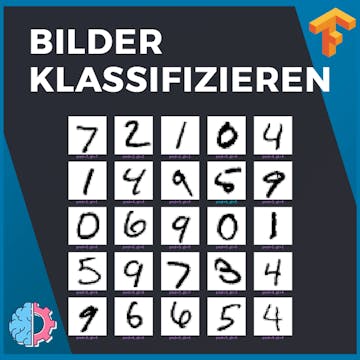
Good to know
Save this course
Activities
Seek mentorship from experts in TensorFlow image classification
Show steps
Gain access to advanced knowledge, insights, and personalized guidance.
Browse courses on
TensorFlow
Show steps
-
Identify individuals with expertise in TensorFlow image classification.
-
Initiate contact and request mentorship.
Review 'TensorFlow for Deep Learning' by Laurence Moroney
Show steps
Strengthen foundational knowledge and theoretical understanding.
View
AI and Machine Learning for On-Device...
on Amazon
Show steps
-
Read chapters relevant to image classification in TensorFlow.
-
Complete exercises and practice problems provided in the book.
Solve practice problems on TensorFlow
Show steps
Improve understanding and practical skills in implementing TensorFlow.
Browse courses on
TensorFlow
Show steps
-
Review TensorFlow basics and concepts.
-
Work through practice problems on image classification using TensorFlow.
Four other activities
Expand to see all activities and additional details
Show all seven activities
Follow tutorials on TensorFlow image classification
Show steps
Build confidence and troubleshoot implementation issues.
Browse courses on
TensorFlow
Show steps
-
Search for and identify relevant tutorials on TensorFlow image classification.
-
Step through the tutorials, following instructions and implementing code examples.
Organize peer study sessions on TensorFlow image classification
Show steps
Facilitate collaborative learning, knowledge exchange, and peer support.
Browse courses on
TensorFlow
Show steps
-
Form a group of peers interested in TensorFlow image classification.
-
Establish regular meeting times and topics for discussion.
Volunteer on projects involving TensorFlow image classification
Show steps
Apply skills to real-world applications and contribute to the community.
Browse courses on
TensorFlow
Show steps
-
Identify organizations working on projects related to TensorFlow image classification.
-
Contact the organizations and inquire about volunteer opportunities.
Mentor other learners in TensorFlow image classification
Show steps
Reinforce knowledge through explanation and improve communication skills.
Browse courses on
TensorFlow
Show steps
-
Identify individuals seeking support in TensorFlow image classification.
-
Provide guidance and mentorship, sharing knowledge and best practices.
Seek mentorship from experts in TensorFlow image classification
Show steps
Gain access to advanced knowledge, insights, and personalized guidance.
Browse courses on
TensorFlow
Show steps
- Identify individuals with expertise in TensorFlow image classification.
- Initiate contact and request mentorship.
Review 'TensorFlow for Deep Learning' by Laurence Moroney
Show steps
Strengthen foundational knowledge and theoretical understanding.
View
AI and Machine Learning for On-Device...
on Amazon
Show steps
- Read chapters relevant to image classification in TensorFlow.
- Complete exercises and practice problems provided in the book.
Solve practice problems on TensorFlow
Show steps
Improve understanding and practical skills in implementing TensorFlow.
Browse courses on
TensorFlow
Show steps
- Review TensorFlow basics and concepts.
- Work through practice problems on image classification using TensorFlow.
Follow tutorials on TensorFlow image classification
Show steps
Build confidence and troubleshoot implementation issues.
Browse courses on
TensorFlow
Show steps
- Search for and identify relevant tutorials on TensorFlow image classification.
- Step through the tutorials, following instructions and implementing code examples.
Organize peer study sessions on TensorFlow image classification
Show steps
Facilitate collaborative learning, knowledge exchange, and peer support.
Browse courses on
TensorFlow
Show steps
- Form a group of peers interested in TensorFlow image classification.
- Establish regular meeting times and topics for discussion.
Volunteer on projects involving TensorFlow image classification
Show steps
Apply skills to real-world applications and contribute to the community.
Browse courses on
TensorFlow
Show steps
- Identify organizations working on projects related to TensorFlow image classification.
- Contact the organizations and inquire about volunteer opportunities.
Mentor other learners in TensorFlow image classification
Show steps
Reinforce knowledge through explanation and improve communication skills.
Browse courses on
TensorFlow
Show steps
- Identify individuals seeking support in TensorFlow image classification.
- Provide guidance and mentorship, sharing knowledge and best practices.
Career center
Computer Vision Engineer
Data Scientist
Machine Learning Engineer
Natural Language Processing Engineer
Artificial Intelligence Engineer
Robotics Engineer
Autonomous Vehicle Engineer
Software Engineer
Data Analyst
Financial Analyst
Business Analyst
Product Manager
Marketing Manager
Sales Manager
Operations Manager
Reading list
Share
Similar courses
OpenCourser helps millions of learners each year. People visit us to learn workspace skills, ace their exams, and nurture their curiosity.
Our extensive catalog contains over 50,000 courses and twice as many books. Browse by search, by topic, or even by career interests. We'll match you to the right resources quickly.
Find this site helpful? Tell a friend about us.
We're supported by our community of learners. When you purchase or subscribe to courses and programs or purchase books, we may earn a commission from our partners.
Your purchases help us maintain our catalog and keep our servers humming without ads.
Thank you for supporting OpenCourser.



